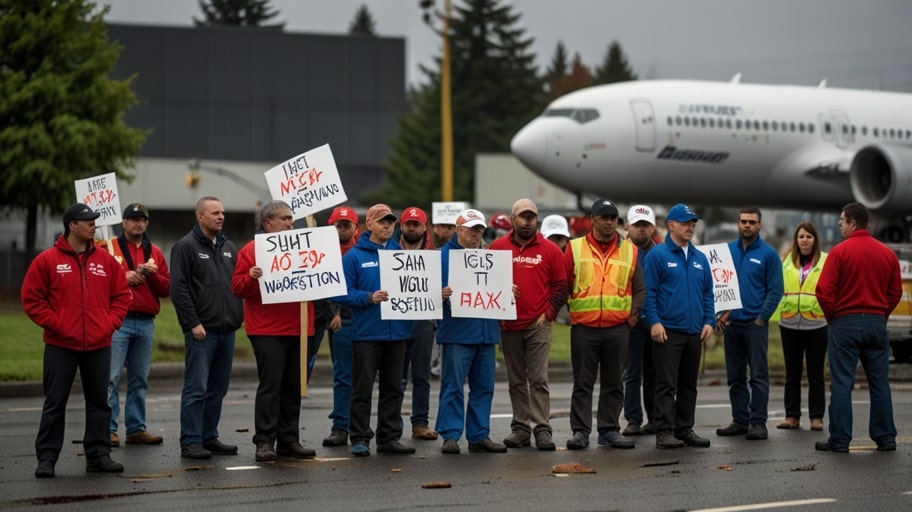On June 16, 2025, Boeing was caught in a key strike by more than 33,000 workers in Seattle, who demanded better salaries and pensions. The International Association of Machinists and Aerospace Workers turned down Boeing’s latest offer, as it claimed that there was not enough pay increment, even after Boeing registered a profit of 6 billion last year. It is the first mega walkout at Boeing since 2008.
The protest mainly occurred at Boeing’s Renton and Everett plants, stopping the production of the 737 MAX, a major revenue-generating plane. As the world demands more commercial jets, the strike derails the delivery of machines to airlines such as United and Delta. The analysts caution about the ripple effects in the aerospace supply chain that may affect suppliers across the globe.
Boeing’s management has acted decisively to prevent the breakdown by buying the services of non-unionized workers to keep the company up and running. But the union is not relenting, and the employees are demanding a 15 percent pay increase and the reinstatement of the defined-benefit pensions. A 10 percent rise offered by the company was not considered good enough, especially in the wake of increased living expenses.
The airplane manufacturing giant already has a quality control-related problem, as it happened earlier this year when a door plug of a 737 MAX fell off. The strike contributes to these difficulties, and it may cause the delay of certification of new aircraft models. Early trading reduced Boeing shares by 4 percent due to the application of such production setbacks.
The global market’s airlines are under pressure because they depend on Boeing jets. Europe and Asian carriers, already working on post-pandemic levels, might go to Airbus, which will ramp up the competition. The smaller suppliers dependent on Boeing contracts are also likely to be under pressure financially should the strike last more than a few weeks.
The union’s demands also indicate wider labor issues in the U.S., where employees are catching loose labor markets to cut better deals. Refusing to renew pensions terminated ten years ago has become a hot-button issue at Boeing. Boeing could be referred to as a company that thrives on the wings of its workers; however, their pay falls short of inflation levels.
Boeing’s CEO, Kelly Ortberg, demanded a new round of negotiations, but not without another fair and sustainable agreement. Yet, union chiefs blame the company for putting its shareholders first in terms of dividends rather than employee welfare. Federal mediators are going to again bargain with them, but there is no swift solution.
The timing of the strike is especially hurtful since Boeing is competing with Airbus to capture market shares. The European competitor has been taking advantage of Boeing’s current misfortune, gaining significant orders from Asian carriers. Should a long strike ensue, this might compromise Boeing’s status even more and call its competitiveness into doubt.
They are encouraging malfunctions in the airline industry with airlines redesigning delivery schedules. United, a company that has 150 737 MAX jets, cautioned of the possible delays in fleet expansion. It may also threaten defense-related contracts such as military aircraft to Boeing, which will put more pressure on the projects of the U.S. government.
According to workers such as Sarah Thompson, who has worked as a Boeing mechanic for 20 years, the strike is all about being respected. We make the aircraft that makes Boeing turn a profit, whilst we are made to work on unsustainable wages, she said to the press. Popularity of the union is on the rise, and the local businesses have taken sides along with the workers.
The aerospace supply chain, already stressed out by post-COVID recovery, is further threatened. Other companies (smaller ones) that provide parts to the 737 MAX can be left without work as the process might get stuck for weeks or even months. Stock-on-stock casualties of the strike could reach as far as Europe and Japan, where suppliers already rely on Boeing orders to supply.
The company could not give an optimistic health pill to its financials; however, it is not as strong as it used to be a few years back, when it was incurring losses due to the 737 MAX grounding and pandemic slowdown. According to analysts, a long strike might cost the company one billion dollars per month. This monetary blow can compel Boeing to reduce planned investment in new aircraft.
The union’s bargaining power is high due to Boeing’s backlog of plane orders, which includes more than 5,000 aircraft. As airlines continue to plead for more new jets, the longer the company takes to put the workers together, the greater the bargaining power among workers. Nevertheless, the continuous interference threatens to drive them to the Airbus A320neo family.
The strike threatens to affect the U.S. economy as federal mediators appeal to both sides to call a compromise. Aerospace contributes 2 percent to GDP, and Boeing’s role is direct. An extended battle would stifle economic activities in the Pacific Northwest, where thousands of people work with Boeing.
Boeing’s already ruined reputation, ravaged by safety scandals, continues to come under fire. The strike pinpoints several tensions between corporate profits and worker compensation, which is a very attractive storyline to the public. Such campaigns, which mobilize social media to raise the voices of the workers, are catching up, and an action by Boeing will be fast.
A worldwide market is observing. If Boeing does not overcome the strike rapidly, competitors such as Airbus will use the occasion to secure long-term contracts. The strike could also give extra boldness to unions at other manufacturers and change the previous dynamics of the industry concerning labor.
The stalemate remains as workers hold pickets in front of Boeing plants. The conclusion will influence the future landscape of Boeing and aerospace in general. When negotiations are reinitiated, the world is anticipating which way stubbornness or hardliners will take this historic labor war.
